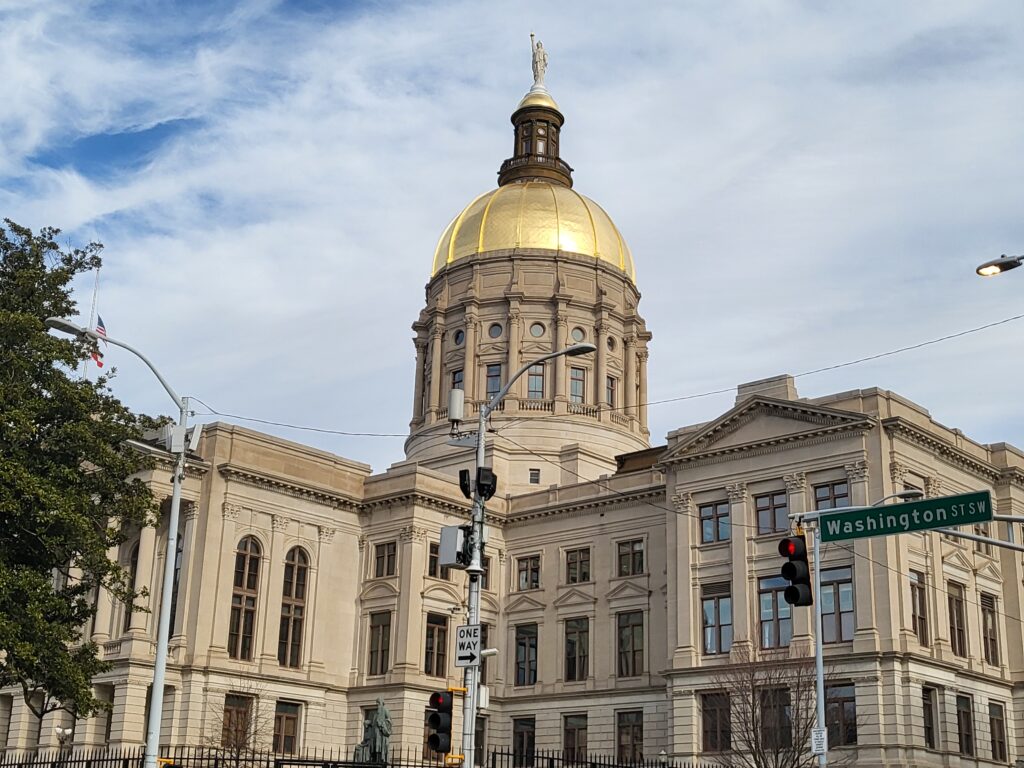Governor Brian Kemp laid bare his vision for the state before lawmakers and Georgians watching during his State of the State address the first week of the 2025 legislative session. Much will be made of his commitment to his state-specific insurance plan, Georgia Pathways, his touting of lowering taxes, or even Kemp’s promise to move more business and job opportunities to rural parts of the state.
However, his full-throated proposal of a “new legal environment” will be the more impactful part of his speech.
Following the joint chamber event, even those working with policy agendas at the Gold Dome aren’t entirely sure what lawmakers and the Governor are working towards with this legislative burden.
From the outset of the convening of the General Assembly this session, one in which folks in the capitol and on the ground advocating for working-class Georgians anxiously await policy that comes down federally, Governor Kemp has been singularly focused on his legislative agenda – tort reform.
According to people somewhat familiar with his plans, the second-term Republican governor is working toward a legal environment “balanced with [Georgia’s] neighbors,” namely, Alabama, Texas, and Florida.
Those same people, Kemp included, say this is his top legislative agenda item for this year.
In a text exchange with The Peach Pit, a research director and law program graduate who works with several advocacy organizations in Georgia says they see the plan for a shift in litigation as a pathway to “creating fewer liabilities for businesses in the state.”
On Capitol Hill, State Representative Tanya Miller- D of the 62nd District has publicly called for more clarity on the potential legislation and a shift in responsibility from Georgia residents and workers to insurance companies in the state.

In an op-ed for the Atlanta Voice, Rep. Miller writes, “Instead of holding insurers accountable, some Georgia Republicans have focused on ‘tort reform,’ limiting [Georgians’] right to seek justice in court.
But so-called tort reform won’t lower [residents’] premiums. It won’t stop insurance companies from denying claims.”
From the State House to Waffle House
Governor Kemp took two minutes of his address to give a political nod to Waffle House operators in Georgia by calling back to a round-table meeting the company hosted for business leaders. During this time, the state Republican leader alluded to lawsuits levied by workers of the popular Southern breakfast chain.
Throughout the governor’s speech, many of Kemp’s supporters met his verbal gesticulations lauding Georgia’s “11 years as the top state to do business” with rapacious applause.
“In fact, [Waffle House is] only closed when disaster strikes or, unfortunately, when they can’t afford to remain open because of a legal environment that forces them to limit hours, hold back on hiring or change their business model,” Kemp said. “Georgia accounts for roughly 22 percent of all Waffle House locations in the country, but almost 37 percent of their litigation costs.
Their liability insurance premiums have gone up 235 percent since 2018, and the average cost for a negligent security lawsuit in Georgia is five times higher than in Florida, nine times higher than Texas, 21 times higher than South Carolina, and 27 times the average cost of similar lawsuits in Alabama.”
For context, in January 2024, the Governor’s office announced that John Fervier, Waffle House’s Vice president of Risk management and security, would be the new chair of Georgia’s State Elections Board.
Oxfam America, a labor organization headquartered in Boston, Massachusetts, seeks to end pay inequality and poverty. It recently assembled a list of the best and worst states to work in 2023. The list ranks Georgia 50th overall in terms of creating “laws to mandate adequate wages, safe conditions, and rights to organize.”
“The reason Waffle House is open on all holidays is because of us workers,” Katie Giede told TPP in an emailed response to the governor’s remarks. Giede is a 10-year veteran of Waffle House and a labor leader with the Union of Southern Service Workers (USSW).
“We have to work on holidays, sacrifice time with our families, and we don’t even make a living wage while we’re there,” she continued. “Corporate makes huge profits on holidays while we do all the work.
Waffle House corporate needs to be meeting with us, not the government. We have serious problems, and we’re proposing solutions, but they won’t even give us a seat at the table. That’s why we’re organizing and unionizing to make ourselves heard.”

Rep. Miller is a practicing litigator in Georgia, specializing in personal injury and civil rights cases. In reviewing the governor’s comments on Waffle House and its workers, she anticipates there is likely more to the announced reform bill that could further impact working-class Georgians’ right to a fair and safe working environment.
“While not entirely clear, his remarks seem to contain a veiled reference to the Waffle House workers’ lawsuit, which demands that the company stop engaging in practices that essentially amount to wage theft and unfair treatment of workers,” Representative Miller said in an issued statement to The Peach Pit.
“What this reveals is that so-called “tort reform” has the potential to be a Trojan horse—paving the way to block citizens from going to court to seek justice, whether it’s because they’re injured or because an employer is engaging in wage theft or forcing workers into unsafe conditions.”
The Clock is Ticking
Lawmakers and their offices have yet to see any concrete legislation that gives them any sense of where Kemp and his party will take tort reform this year. However, during his address, the former Georgia Secretary of State made sure to mention the bill’s far-reaching nature.
“The tort reform legislation my office will introduce in the coming days will be comprehensive – but fair,” the Governor hinted in his address. “Because in Georgia, we believe those who do wrong should be held accountable. And if you have been wronged, you deserve justice.”
This sweeping reform could result in more local districts deciding to aggressively pursue anti-immigration policies, policies that further criminalize protest, and a jump in the number of restrictions placed on bail, some experts say.
Georgians are waiting to see whether Kemp will introduce anything at all this session and whether it will address the core issues he says are at the heart of the bill. He has even suggested that a summer session could be convened if a bill is not passed during the spring.
“While we’re waiting to see the actual legislation proposed,” Rep. Miller continued, “Any conversation about the cost of insurance that excludes scrutiny of insurance industry practices makes it clear that they are not serious about helping Georgians.”

Daniel Richardson
Daniel Richardson is the managing editor of The Peach Pit. The formative years of his career were rooted in people-centered news coverage, particularly in the Atlanta and metro areas. His work has appeared in the Covington News, The Georgia State Signal, and others. After graduating from Georgia State University, he transferred his scholarship in Black, diasporic studies in movement journalism.

0 Comments